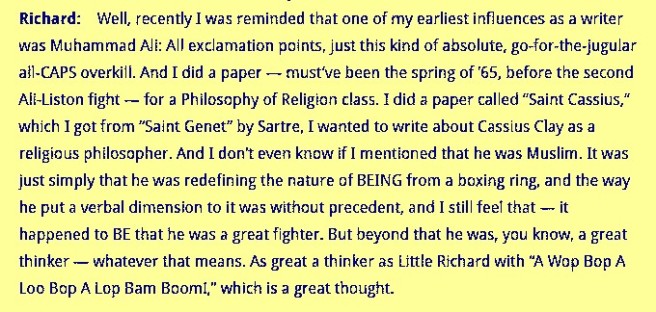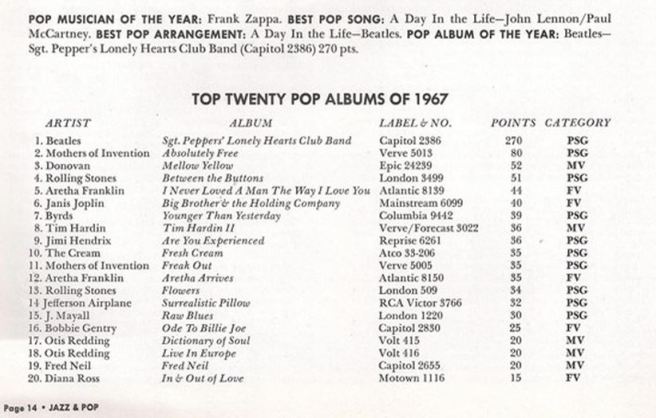In 2001 we posted a transcribed version of a “lost” Lester Bangs interview from 1980 Continue reading “Bangs Radio Interview 1980 (audio version)”
Category: Archival
Interview with Jason Gross (Perfect Sound Forever)
Jason Gross is the founder and editor of Perfect Sound Forever, the longest-running internet music publication, with its monthly schedule dating back to 1993 (roughly three years before I even knew what a “web” was). Gross has written for numerous publications over the years (Spin, the Village Voice, Blurt, et al.), produced critically acclaimed CD reissues by Delta 5, Kleenex, and Essential Logic (via the Kill Rock Stars label), and for many years was a panelist and organizer at SXSW, which, like everything else in the entertainment industrial complex, is currently on hold due to COVID. Continue reading “Interview with Jason Gross (Perfect Sound Forever)”
Best Music Journalism/2021 edition (Jason Gross/R&R Globe)
I interviewed Jason recently about this feature—19 years in the running—which will be posted here hopefully later this week.
Boston Phoenix archives
The Boston Phoenix (1973-2013), once home to many great music critics, is now available online, full issues intact, and it includes a search engine. (Navigation, as with 99% of archival stuff you find on the web, is a little less than intuitive, but hey.)
Today’s Recommended Read: Critical Conditions (Wayne Robins)
I interviewed Wayne a few years back when he was attending an event in Toronto. Spent a very thoughtful two hours in his hotel room, discussing a variety of subjects (cheeseball that I am, I think I even got him to sign a Roxy feature he penned for Creem c. 1974), but for complicated reasons even I can’t recall at this point, I never managed to pull a proper piece together. I still have the audio files, though, perhaps I should, uh, finally get on it.
“what even is a review?”
A formidable question, posed by Mark Sinker at Freaky Trigger, and a fetching/daunting examination of its many contours and contradictions. The surgery begins with a complaint (from a friend of Mark’s) about Nick Tosches’ review of Black Sabbath’s Paranoid in Rolling Stone, I think because Tosches seems to not address the record itself. Which leads to a trail of thought that includes Flaubert, the Grotesque (not the Fall album), Kubrick’s Eyes Wide Shut, and the dread NoiseBoysism. Sinker on the latter:
Richard Meltzer, Lester Bangs, Nick Tosches: when James Wolcott dubbed them the Noiseboys, he did everyone (as so often) a disservice, including them, by collapsing them into just one wild-style jerk-store project and mislabelling it to match. They were friends in mischief, to be sure, but they were none of them particularly like one another in style or even tactic. What they did in fact share was a perverse attitude towards deep cultural knowledge, a feel for how to write and how to play and what was out there besides just rock. Elsewhere rockwrite was already sleepwalking uneasily — so they felt — towards a narrow pedantry, autodidact learning as a mode of borrowed bad authority. One escape route: knowledge as all-purpose bust-it-wide toolkit, as weaponry on behalf of the militant mutant grotesque that was rockthink’s earliest best contribution.
Lester on Ringo & George (Hi-Fi Stereo Review)




The above appeared in the June 1975 issue of Stereo Review (formerly Hi-Fi Stereo Review), now archived here. The letters are in reference to a Bangs twin review, from March ’75 (one I’ve never seen before) of Harrison’s Dark Horse and Ringo’s Goodnight Vienna (a “metal-flake glow-in-the-dark music box”).
More links to HFSR stuff ahead.
Death Rock 1990

“Don’t fear the reaper: Five great death records, by Naveel Zuberi, Michigan Daily, Jan 31, 1990. (This well-written top 5 survey draws a connection between the Shangri-Las and the Smiths….neat.)
“In the ’70s, directions are unclear…”
No author cited in this AP piece from May 28, 1976, conveying mostly confusion and disillusionment (“a certain sadness,” admits Bill Graham). I’m trying to square the sentiments here with Christgau’s notion of “semipopular” but I’m not getting too far (in part because I haven’t thought that deeply about Christgau’s notion of “semipopular,” but I’m thinking that I should). Whether or not it’s too obvious a cliché to point out that The Ramones was released almost precisely a month before this article appeared, there’s no question that around-the-corner was about to get pretty interesting.
“redefining the nature of BEING…”
 Richard Meltzer, rockcritics.com interview, 2000
Richard Meltzer, rockcritics.com interview, 2000
Pop as Self-denial
“I’ve long suspected that those who rail most vehemently against the banalities of mainstream pop do so because they can’t stand the fact that they react to the music. It drives them crazy to hear a snippet of ‘I Just Called to Say I Love You’ and then have the damned hook bouncing around their head for the rest of the afternoon. But rather than face the issue head on, and risk admitting that there’s something appealing about the bald melodicism and sentimentality of such a tune, they instead go into denial, denigrating people who do like the tune, and even urging that the thing be wiped from the face of the earth.”
– J.D. Considine, rockcritics.com interview, 2000
Pop as a Sickness
“People sometimes ask why a serious, well-educated, intellectual fellow such as me wastes his time and enthusiasm on the most insignificant passing trends and the most contrived, trashy music he can find. And I don’t know what to say. I just can’t get into George Harrison, Seals & Crofts or even Van Morrison and the Band. I like that stuff, but it simply doesn’t excite me the way, say, Bobby Sherman or David Peel do. I must be sick.”
– Greg Shaw, review of Slayed, Creem, April 1973
1967 Jazz & Pop Results
From Jazz & Pop Magazine (formerly Jazz), the results of a critics poll right at the dawn of rock criticism (would like to know who actually voted). Biggest surprise to me is Donovan at #3. (Thanks Michaelangelo Matos for the tip.)
Quote of the Day (3/11/14)
“I think maybe I feel a little out of place in the critic’s world because a) I’m a scientist and, b) I’m damn handsome. I would have enjoyed being a medical researcher, I think. It’s a good thing I can’t go back in time, because I have about 89 careers I’d like to try.”
– John Kordosh, interview in rockcritics.com, 2004 (still on the to-be-imported list)
Meet the Critics
What the critics wrote about the Beatles in 1964 (compiled by Cary Schneider, L.A. Times)
I did a similar roundup here a few months back – Beatles Invade American Newspapers, Feb 1964 – but my interest was less in what people were saying about the Beatles at the time (not that that’s at all uninteresting) than in what else was going on (headline- and ad-wise, I mean) around the swirl of Beatlemania: Oswald, Castro, marijuana, Cambodia, Gitmo, Guantanamo, colour TV, etc. How and where did the Beatles fit into the collage of American life ca. Feb ’64?

















